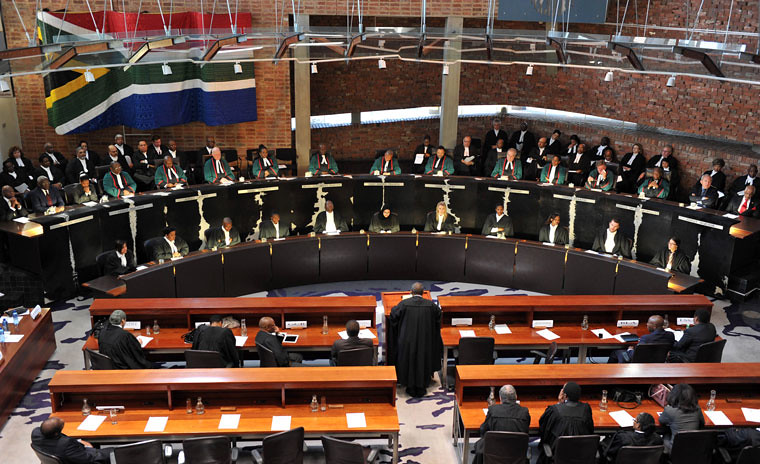Last week, at the Constitutional Court’s 30th anniversary on 20 June, President Cyril Ramaphosa announced a landmark reform: the formal establishment of the judiciary as an independent institution.
While South Africa’s judges already enjoy the freedom to make rulings without outside influence, they don’t yet control how courts are run or how budgets are allocated. That power currently rests with the Department of Justice — a setup Ramaphosa called an “anomaly” in our democratic system.
To unpack what this long-awaited shift could mean for the justice system — and for everyday South Africans — explain.co.za spoke with Mbekezeli Benjamin, a legal researcher and advocacy officer at Judges Matter. Based at UCT’s Law Faculty, Judges Matter monitors South Africa’s judiciary to ensure transparency and accountability. At just 31, Benjamin has become one of the country’s leading voices on judicial reform.
What does it mean to “formally establish the judiciary as an independent institution”?
“Currently, the Judiciary (both the lower courts and the superior courts) are housed within two national government departments, under the Minister of Justice. Establishing the Judiciary as an independent institution means that the Judiciary will be united within a single department under the Chief Justice, with independent control over its own operations,” says Benjamin.
In plain terms, this means the courts won’t have to answer to a government minister anymore. Instead, the Chief Justice will call the shots, making decisions about how the courts run, from staffing to fixing broken equipment. It’s about giving judges the freedom to manage their own house.
Can you explain what judicial independence actually covers and how it’s different from what we have now?
“In terms of section 165 of the Constitution, judicial independence has two meanings: (1) individual judicial independence, which means that individual judges can take decisions independently, in line with the law, and free from influence and without fear or favour; (2) institutional judicial independence, which means that judges have independent control over court operations and administration, and the budgets of the courts,” Benjamin explains.
Simply put, judges in South Africa already make rulings without anyone leaning on them—that’s the individual independence bit. But the institutional side? That’s where things get tricky. Right now, the government controls the courts’ money and operations, so judges can’t fully decide how to run things. This change will let them manage their own budget and priorities, making the system more efficient.
How will control over budget and administration impact daily court operations?
“If the judiciary had greater control of their own budget and administration, they are able to deploy those resources in areas that affect court operations the most,” Benjamin notes.
He points out that South Africa has too few judges, causing massive backlogs with cases piling up waiting to be heard. With their own budget, the judiciary could hire more judges and legal researchers to speed things up. Imagine courts moving faster, with fewer delays and quicker, well-researched judgments. That’s the goal here.
What’s in it for ordinary South Africans? How does this help with access to justice?
“An independent judiciary is vital for the protection of human rights, and access to justice, including dealing with crime and corruption,” says Benjamin. He adds that it’s also key for the economy: “No investor will start a business where there is no independent judiciary or trust in the courts to enforce business contracts, and resolve disputes.”
This means courts that work better at catching criminals and protecting people’s rights. Plus, businesses will feel safer investing in South Africa, which could mean more jobs. For you and me, it’s about knowing the courts are there to fairly sort out disputes, whether it’s a small claim or a big corruption case.
President Ramaphosa called the current setup an “anomaly.” How does it affect the rule of law?
“Currently, Parliament has its own budget and administration, which is under the control of the Speaker. The same for the government, which is under the control of Ministers and the President. The ‘anomaly’ Ramaphosa refers to is that the judiciary administration and budget is not under the control of the Chief Justice, but the Minister of Justice,” Benjamin explains.
Basically, Parliament and the government run their own show, but the courts are stuck under the Minister of Justice’s thumb. This slows things down—cases take longer because judges can’t make quick decisions about their own resources. That weakens the rule of law, as justice delayed is often justice denied.
Will this make people trust judges more, knowing their decisions aren’t swayed by money or power?
“A key method to boost confidence in judges’ independent decision-making is to make the law and court processes more transparent,” Benjamin says. He highlights that South Africa’s courts are already open to the public, with some cases even shown on TV or online.
This reform isn’t directly about stopping bribes—it’s more about making sure judges can do their jobs without government red tape. But transparency, like clear judgments everyone can understand, helps people see that judges are ruling fairly, whether the case involves a big shot or an ordinary person.
Why’s everyone calling this a “game changer” for South Africa’s democracy?
“Conversations about judicial independence have been going on for more than 20 years, (since 2004), but they have not yet reached resolution. In that context, the President’s announcement is a gamechanger,” says Benjamin.
This is a big deal because it’s the first time in decades that real steps are being taken to make the judiciary truly independent. It’s like finally giving the courts the keys to their own future, strengthening our democracy by ensuring no one can meddle with justice.
What problems do South Africans face because the judiciary relies on the government, and how will independence fix them?
Benjamin gives a clear example: “Currently, if there is a problem with a generator or the air-conditioning system at a court in, for example, Thohoyandou Limpopo, the judges need to first speak to the head of the Office of the Chief Justice, then the head of the Department of Justice, and then the head of the Department of Public Works, before it can be fixed.”
That’s a lot of phone calls just to fix a broken air-con! With independence, judges could deal directly with one person in their own department, speeding up fixes and keeping courts running smoothly. This means less waiting for South Africans needing justice.
How do we make sure an independent judiciary doesn’t become too powerful with no checks?
“This is an issue which we hope the president would give more details on,” Benjamin admits. He suggests, “The best safeguards that could be put in place to ensure accountability is to require the Chief Justice and the leadership of the judiciary to deliver reports that account to parliament on court operations, including the budget of the judiciary.”
In other words, the judiciary would still answer to Parliament, like how the Auditor General reports on government spending. This keeps the courts accountable without letting them run wild.
How will the joint committee make sure this reform works for all South Africans?
“The joint committee is made up of a group of ministers working alongside a group of judges, to finalise the details and action plan to ensure institutional judicial independence,” Benjamin explains.
This mix of government and judicial voices means they’ll hammer out a plan that fits South Africa’s Constitution while focusing on making courts work better for everyone. It’s about ensuring justice is accessible, whether you’re in a big city or a small town.
After years of debate, South Africa may finally be taking decisive steps to put the judiciary on equal footing with the other arms of government. If implemented effectively, the reform could speed up court processes, reduce backlogs, and restore public trust in a system that is meant to serve everyone — not just the powerful.
As Benjamin reminds us, this isn’t just a technical change. It’s a vital part of deepening democracy, protecting rights, and making justice work in the real world, for real people.
Emma is a freshly graduated Journalist from Stellenbosch University, who also holds an Honours in history. She joined the explain team, eager to provide thorough and truthful information and connect with her generation.




